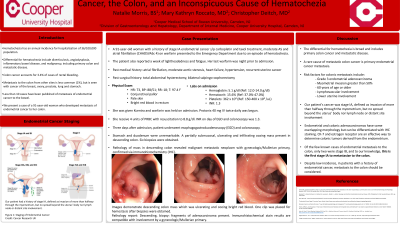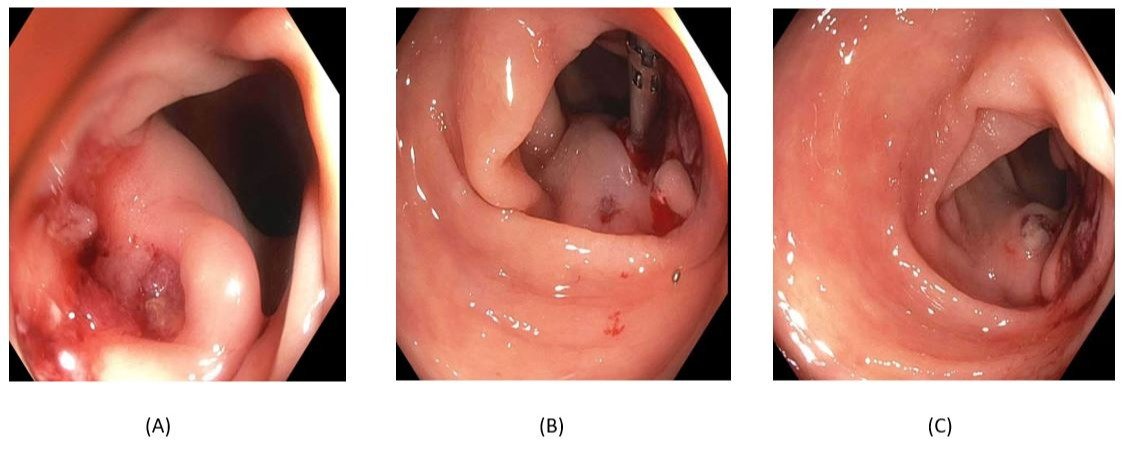Back


Poster Session A - Sunday Afternoon
Category: GI Bleeding
A0312 - Cancer, the Colon, and an Inconspicuous Cause of Hematochezia
Sunday, October 23, 2022
5:00 PM – 7:00 PM ET
Location: Crown Ballroom

Has Audio
- MR
Mary Kathryn Roccato, MD
Cooper University Hospital
Camden, NJ
Presenting Author(s)
Natalie Morris, BS1, Mary Kathryn Roccato, MD2, Christopher Deitch, MD3
1Cooper Medical School of Rowan University, Philadelphia, PA; 2Cooper University Hospital, Camden, NJ; 3Cooper University Hospital, Cherry Hill, NJ
Introduction: Hematochezia has an annual incidence for hospitalizations of 36 per 100,000 population. The most common causes are diverticulosis, angiodysplasia, inflammatory bowel disease and malignancy, including primary colon and metastatic disease. Only about 1% of all colorectal tumors are from secondary metastases, usually of the breast, ovary, prostate, lung and stomach. Metastasis of endometrial cancer to the colon is extremely rare, and this is the first known case in the literature of previously evaluated stage IA endometrial cancer metastasizing to the colon.
Case Description/Methods: A 91-year old woman with a history of stage IA endometrial cancer treated with carboplatin and taxol and atrial fibrillation on warfarin presented to the ER with one week of hematochezia, lightheadedness and fatigue. Physical exam revealed bright red blood on rectal exam. Her hemoglobin resulted at 5.1 g/dL (from 10.6 g/dL). After empiric prothrombin complex concentrate and four units of packed red blood cells, hemoglobin improved to 8.8 g/dL and INR was 1.3. Colonoscopy found an ulcerating, infiltrative mass in the descending colon which was biopsied and clipped for hemostasis. Pathology showed malignant metastatic neoplasm with endometrial primary, confirmed via immunohistochemistry staining.
Discussion: This case represents a rare cause of metastatic colon cancer: primary endometrial metastasis. Prior to hospitalization, she was stage 1A, defined as invasion of more than halfway through the myometrium, without spread beyond the uterus’ body nor lymph node or distant involvement, however her colon mass was positive for endometrial origin. Primary endometrial cancer metastasizing to the colon is extremely rare, with less than 10 published cases. Risk factors for colonic spread include grade 3 endometrial adenocarcinoma, myometrial invasion greater than 50%, age over 60, lymphovascular or lower uterine. Of the few known cases of endometrial metastasis to the colon, two were stage IB, and to our knowledge, this is the first case of stage IA endometrial cancer that metastasized to the colon. Despite low incidence, colonic metastases should be suspected in patients with stage IA endometrial cancer presenting with hematochezia.

Disclosures:
Natalie Morris, BS1, Mary Kathryn Roccato, MD2, Christopher Deitch, MD3. A0312 - Cancer, the Colon, and an Inconspicuous Cause of Hematochezia, ACG 2022 Annual Scientific Meeting Abstracts. Charlotte, NC: American College of Gastroenterology.
1Cooper Medical School of Rowan University, Philadelphia, PA; 2Cooper University Hospital, Camden, NJ; 3Cooper University Hospital, Cherry Hill, NJ
Introduction: Hematochezia has an annual incidence for hospitalizations of 36 per 100,000 population. The most common causes are diverticulosis, angiodysplasia, inflammatory bowel disease and malignancy, including primary colon and metastatic disease. Only about 1% of all colorectal tumors are from secondary metastases, usually of the breast, ovary, prostate, lung and stomach. Metastasis of endometrial cancer to the colon is extremely rare, and this is the first known case in the literature of previously evaluated stage IA endometrial cancer metastasizing to the colon.
Case Description/Methods: A 91-year old woman with a history of stage IA endometrial cancer treated with carboplatin and taxol and atrial fibrillation on warfarin presented to the ER with one week of hematochezia, lightheadedness and fatigue. Physical exam revealed bright red blood on rectal exam. Her hemoglobin resulted at 5.1 g/dL (from 10.6 g/dL). After empiric prothrombin complex concentrate and four units of packed red blood cells, hemoglobin improved to 8.8 g/dL and INR was 1.3. Colonoscopy found an ulcerating, infiltrative mass in the descending colon which was biopsied and clipped for hemostasis. Pathology showed malignant metastatic neoplasm with endometrial primary, confirmed via immunohistochemistry staining.
Discussion: This case represents a rare cause of metastatic colon cancer: primary endometrial metastasis. Prior to hospitalization, she was stage 1A, defined as invasion of more than halfway through the myometrium, without spread beyond the uterus’ body nor lymph node or distant involvement, however her colon mass was positive for endometrial origin. Primary endometrial cancer metastasizing to the colon is extremely rare, with less than 10 published cases. Risk factors for colonic spread include grade 3 endometrial adenocarcinoma, myometrial invasion greater than 50%, age over 60, lymphovascular or lower uterine. Of the few known cases of endometrial metastasis to the colon, two were stage IB, and to our knowledge, this is the first case of stage IA endometrial cancer that metastasized to the colon. Despite low incidence, colonic metastases should be suspected in patients with stage IA endometrial cancer presenting with hematochezia.

Figure: Descending colon mass which was ulcerating and oozing bright red blood. Pathology found adenocarcinoma fragments with immunohistochemical staining compatible with gynecologic/Mullerian primary.
Disclosures:
Natalie Morris indicated no relevant financial relationships.
Mary Kathryn Roccato indicated no relevant financial relationships.
Christopher Deitch indicated no relevant financial relationships.
Natalie Morris, BS1, Mary Kathryn Roccato, MD2, Christopher Deitch, MD3. A0312 - Cancer, the Colon, and an Inconspicuous Cause of Hematochezia, ACG 2022 Annual Scientific Meeting Abstracts. Charlotte, NC: American College of Gastroenterology.
